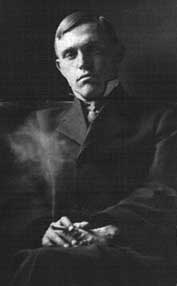Damon Runyon

Now one time it comes on Christmas, and in fact it is the evening before Christmas, and I am in Good Time Charley Bernstein's little speakeasy in West Forty-seventh Street, wishing Charley a Merry Christmas and having a few hot Tom and Jerrys with him.
Damon Runyon (1880 – 1946) was an American journalist and author, best known for his short stories about the colorful gamblers, gangsters and hustlers of New York in the early part of the twentieth century. His stories are narrated in the first person by an anonymous narrator with a distinctive slang-laced style that avoids the past tense and only rarely dips into the future tense.
Notable adaptations of Runyon stories include:
- Guys and Dolls
- Lady for a Day
- Little Miss Marker, an early hit for Shirley Temple.
- Ambiguously Jewish: Runyon's narrator(s). One story starts with him dining on gefilte fish at
Lindy'sMindy's deli. - Anti-Villain: Many of Runyon's lead characters are technically (or more than technically) criminals, but none seem particularly evil. Even the title character of "Earthquake" -- an admitted cop killer -- dies heroically, saving (among many others) the policeman who has tracked him down and intends to bring him to justice.
- Badass and Child Duo: A strange twisted version is present in "Butch Minds the Baby", where retired safecracker Big Butch takes his infant son (and the narrator, for unclear reasons) along with him on one last big score.
- Big Eater: Nicely-Nicely Jones in "A Piece of Pie".
He is a horse player by trade, and eating is really just a hobby, but he is undoubtedly a wonderful eater even when he is not hungry.
- The Butler Did It: Parodied in "What, No Butler?"
- Delusions of Eloquence: The theme of mooks talking over their heads is a mainstay.
- Dying Moment of Awesome: The title character of "Earthquake".
- First-Person Peripheral Narrator: The anonymous narrator (or narrators -- when he is so anonymous, who can tell?).
- Homage: Spider Robinson's 1981 short story "Chronic Offender" is a spot-on Runyon Pastiche featuring more than a few familiar faces.
- Laser-Guided Karma: In "Dancing Dan's Christmas", Dancing Dan decides on a whim to borrow a drunken Mall Santa's outfit and deliver Christmas cheer to some poverty-stricken persons of his acquaintance. This whim saves his life.
- Load-Bearing Hero: The title character in "Earthquake". "Earthquake" ends with 'Earthquake' holding up an orphanage door to allow the nuns, children—and the policeman chasing him for a cop-killing—to escape the collapsing building. Even Earthquake can't stand up to a second temblor, though.
- No Celebrities Were Harmed: The famous Lindy's deli/restaurants appear throughout Runyon's stories as "Mindy's".
- Police Are Useless: Both invoked and averted depending on the story. The cop in "Earthquake" is dedicated and skilled enough to track and pursue the title character all the way to South America; while the cops in "Butch Minds the Baby" are affably clueless. And a subversion of the trope makes for a punchline at the end of the latter story.
- Present Tense Narrative: Runyon's characters almost always all speak in the progressive present tense. (When they don't, they speak in the progressive future.) Runyon made this such a trademark of his work that any author attempting to use it will be accused of mimicking his style.
- Princess for a Day: Apple Annie in "Madame La Gimp".
- Professional Gambler: Sky Masterson, Nathan Detroit and numerous other characters.
- Safecracking: A major plot element of "Butch Minds the Baby".
- Signature Style: Anonymous first-person narrators and characters all speaking in Present Tense Narrative with a mixture of period slang and Delusions of Eloquence:
If I have all the tears that are shed on Broadway by guys in love, I will have enough salt water to start an opposition ocean to the Atlantic and Pacific, with enough left over to run the Great Salt Lake out of business. But I wish to say I never shed any of these tears personally, because I am never in love, and furthermore, barring a bad break, I never expect to be in love, for the way I look at it love is strictly the old phedinkus, and I tell the little guy as much.